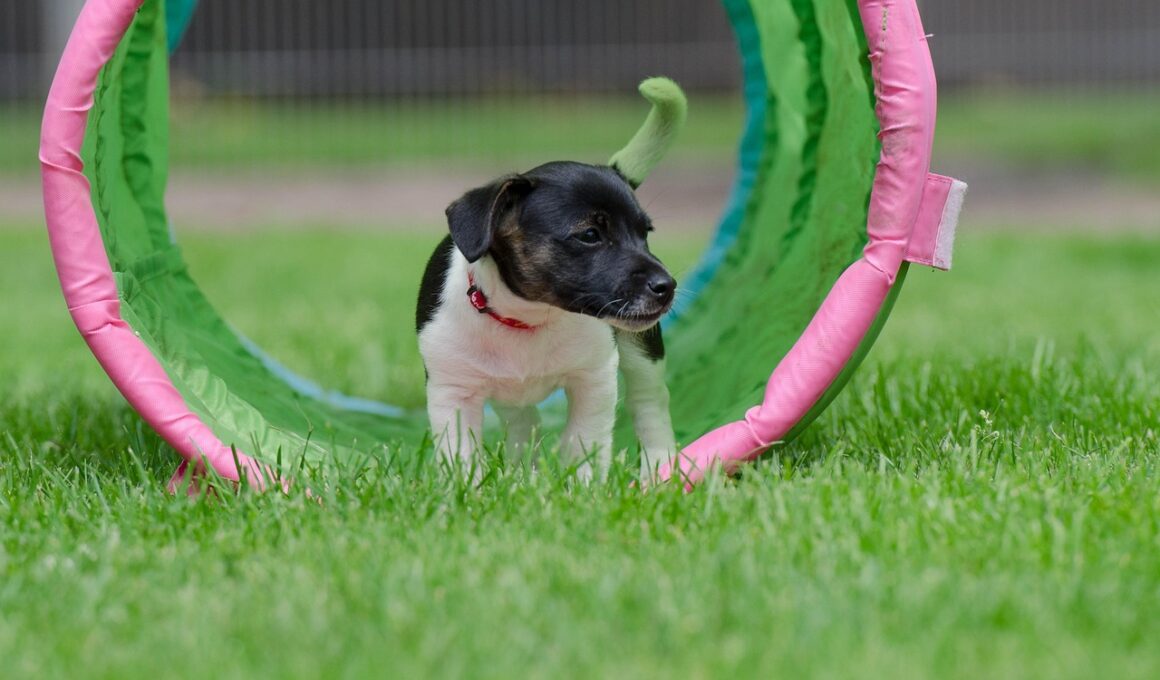The Power of Play: Socializing Puppies in Rescue Environments
Socializing puppies in rescue environments is crucial for ensuring their well-being and adaptability. In the shelter setting, puppies often experience anxiety and fear, being away from their mothers and siblings. To combat this, engaging them in playful activities can ease their transition. Play fosters trust and forms strong bonds between humans and puppies. Additionally, it encourages healthy interactions with other dogs. An effective way to facilitate socialization is through structured play sessions, where staff, volunteers, and potential adopters participate. Regularly scheduled playdates offer puppies the opportunity to learn important social skills, such as body language and bite inhibition. Surprisingly, even shy pups blossom during these interactions, demonstrating their unique personalities. Every pup has different comfort levels, influencing how they behave. Staff must observe and adjust play activities accordingly, ensuring each puppy has a positive experience. Moreover, these socialization sessions often transform fearful puppies into joyful, spirited companions ready for adoption. Ultimately, investing time in play enriches a puppy’s life, making them more attractive to potential adopters. This not only helps them find forever homes but also integrates them into the community, promoting a dog-friendly environment.
When puppies arrive at rescue shelters, they come from varying backgrounds and experiences. Some may have never had the chance to play, while others might be overwhelmed by their new surroundings. Understanding the diverse experiences of these puppies is essential for tailored socialization approaches. Play is a powerful tool that can create a safe space for puppies to express themselves freely. In a structured environment, puppies learn to interact positively with both humans and their canine peers. The introduction of toys can further enrich the experience, as they promote natural behaviors. Using items such as tennis balls or tug toys encourages playfulness and introduces competition in a healthy way. Volunteers can facilitate these interactions, guiding puppies through play without overwhelming them. Each session contributes to building their confidence and skills. Furthermore, positive reinforcement during play helps reinforce desirable behaviors. For example, rewarding a puppy for sharing a toy establishes good social habits. Such experiences prepare puppies for their future homes, enhancing their trainability and adaptability in new situations. This foundation lays the groundwork for a well-rounded adult dog capable of forming lasting relationships with their families.
Benefits of Group Play
Group play sessions provide numerous benefits for puppies in rescue environments. They not only help in building social skills but also facilitate physical development. As puppies romp and frolic with their peers, they naturally engage in physical exercise. This playtime allows them to expend energy in a fun and safe manner, which is vital for their healthy growth. Additionally, supervised group play encourages the development of good manners and etiquette. Puppies learn to respect personal space and boundaries, both from other dogs and people. These experiences lay the groundwork for a well-socialized adult dog who understands how to interact appropriately with all members of the family. Moreover, group play builds friendships; puppies establish bonds with fellow participants, fostering a sense of belonging that can reduce anxiety. When puppies feel comfortable in their environment, they’re more likely to be playful and outgoing. The joy observed during group play is contagious and uplifting for everyone involved. Witnessing shy pups blossom into confident, playful creatures reinforces the importance of socialization efforts at rescues. Ultimately, group play fosters community and support among puppies, preparing them for successful transitions into loving forever homes.
Incorporating training into playtime can significantly enhance a puppy’s socialization experience. Training methods that utilize play can be adapted for various playful activities. For example, teaching commands like “sit” or “stay” can be combined with fetch games or tug-of-war. The immediacy of rewards during play helps instill obedience in an enjoyable way. Such techniques further solidify the bond between the puppy and their handler, creating a trusting relationship. Additionally, these skills have long-lasting effects beyond the shelter, helping dogs adjust in new environments. Teaching proper leash manners through a game of chase encourages the puppy to focus on their owner while having fun. Structured play that emphasizes training creates an opportunity for socialization without pressure. Furthermore, this method allows puppies to learn in a low-stress environment. By reinforcing positive behaviors during fun activities, puppies are more likely to retain the lessons learned. This approach ensures they will interact appropriately with their future families. As puppies develop skills and confidence through play, they become more appealing candidates for adoption, paving the way for successful placement into loving homes.
Role of Volunteers
Volunteers play an invaluable role in socializing puppies within rescue environments. Their dedication and compassion help facilitate vital social interactions. One of the key responsibilities of volunteers is conducting play sessions, enabling puppies to engage freely with each other. In addition to supervising playtime, volunteers play a pivotal role in observing puppy behavior and progress. Their observations can inform staff about the individual needs of each puppy, ensuring more tailored and personalized care. Volunteers also provide critical companionship, allowing puppies to feel safe and secure. Simple acts, such as petting or cuddling, dramatically influence a puppy’s confidence. Moreover, they can introduce puppies to various stimuli, helping them adapt quickly to different sounds, sights, and smells. For instance, encounters with people of all ages aid in exposing the puppies to diverse environments and individuals. Group activities led by volunteers create a sense of community not only among puppies but also within the shelter. Their involvement fosters an environment of love and support. Ultimately, the role of volunteers is crucial for successful puppy socialization and is instrumental in guiding them towards forever homes, enriching their lives and the lives of their future families.
The impact of play extends beyond immediate benefits to puppies in rescue situations. Socialization through play creates a ripple effect that benefits the entire community. Well-socialized puppies become happier, healthier adults, capable of engaging with their new families and surroundings positively. These pets are less likely to develop behavioral issues, reducing the strain on a family and the community. Communities thrive when they have happy, well-adjusted dogs living among them. Therefore, successful rescue organizations focus on play as a key strategy in their socialization programs. When puppies transition from rescue to adoption, they bring with them learned behaviors that make them great companions. Families that adopt these puppies are more likely to embrace the joy of pet ownership since they receive well-socialized and trained pets. The emphasis on play and socialization not only improves the puppies’ quality of life but also enhances the overall reputation of the rescue organization. Consequently, successful programs can lead to higher adoption rates and increased community support. By prioritizing play as a valuable tool, rescues contribute positively to both the puppies and their future families, fostering a harmonious relationship.
Adoption Success Stories
Numerous adoption success stories highlight the transformational power of socializing puppies through play. Many rescue organizations can recount tales where shy, fearful pups turned into exuberant, loving companions. One heartwarming case involved a timid beagle who struggled to engage with her peers. Through regular play sessions, she quickly grew in confidence, eventually discovering her playful side. Adopters often describe the joy of witnessing their new puppy’s development, enamored by their playful personalities. Similarly, another rescue shared the story of a once-anxious terrier mix who learned to trust humans through gentle, playful interactions. These stories serve as powerful reminders of the life-changing impact of socialization. Puppies that experience play in a supportive environment are much more likely to thrive in their new homes. The emphasis on play fosters connections, enriching both the puppy’s life and that of their adoptive family. Rescue organizations celebrate each success story, knowing that each playful interaction contributes to a happier ending. Thus, these narratives inspire volunteers and staff to continue their essential work, knowing that the power of play can transform lives and forge unbreakable bonds.
In conclusion, socializing puppies in rescue environments through play is a vital component of their development. The benefits stretch beyond immediate happiness for the puppies, impacting their future relationships and adaptability in new homes. Each playful interaction builds confidence, nurtures skills, and creates a solid foundation for lifelong companionship. Volunteers and staff working with rescue puppies contribute significantly to their future success, utilizing play as a transformative tool. The collective efforts of dedicated individuals in a shelter setting can offer hope and healing. Moreover, socialization via play not only benefits the puppies but also enriches the community as a whole, fostering a culture of understanding and appreciation for dogs. Communities filled with well-socialized dogs are more harmonious and understanding. Thus, investing time and resources into playful socialization creates a positive experience for puppies, volunteers, and adopters alike. Every playful romp not only aids in socialization but also shows how love and care can transform lives. As we encourage responsible adoption and support shelters, it’s essential to recognize the power of play in shaping resilient, loving companions. Together, we can ensure that every puppy becomes a cherished member of the family.


